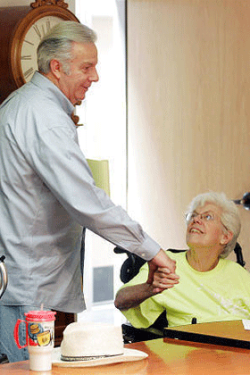CCHD funds used to empower the poor

SALT LAKE CITY - Earlier this year, when the Utah Transit Authority (UTA) proposed a 250 percent increase for paratransit users, members of the Disabled Rights Action Coalition (DRAC) rolled into action.
"That was going to price most everybody who uses the service out of it," said Jerry Costley, DRAC's executive director. "It's a critical service. It gets people to where they get their groceries; it gets people to medical appointments. Many of these individuals have fairly intense medical needs. It was really going to trap them inside of their homes. No one else in the entire state was getting that kind of rate increase and yet, by definition, these are people who cannot work and who are the poorest of Utah's poor. It was just very, very unfair."
DRAC members lobbied local governments to oppose the increase and traveled en masse to Ogden to present their case to a UTA board member. In the end, UTA officials didn't go forward with the increase.
DRAC's efforts were funded, in part, but a grant from the Catholic Campaign for Human Development, which "empower the poor and help them organize themselves to move out of poverty," according to the United States Conference of Catholic Bishops, which oversees the CCHD. All projects supported by the CCHD must conform to the moral guidelines of the Catholic Church, and are monitored if they're found to be inconsistent with these teachings.
DRAC's activities are "very much in line with the Catholic tradition of honoring the poor and planning for the needs of the poor," Costley said. "The majority of individuals who are members of our organization are individuals who have not often had a voice or who society has told them that they don't have a voice or that their voice doesn't count. When we organize, it allows them to come forward and have that voice, to claim that voice and to make change and to insist on change and justice on their own behalf."
The CCHD funding has allowed DRAC to organize more effectively and provides technology such as a website and helps pay members' travel expenses while lobbying, he added. Without the CCHD funds, "it would make it very, very difficult for us to function. We certainly would not have the degree of effectiveness that we did."
DRAC, which was formed in 1993, is the only Utah organization funded by CCHD this year. However, in the past, as many as four programs in a year have received funding, said Dee Rowland, the Diocese of Salt Lake City director of CCHD. "Throughout the 20-some years I've been involved, projects in Utah have received more money than the total of the contributions from our diocese," Rowland said. "It's been a very good program for this diocese, if you believe in empowering people to attempt to solve their own problems."
Among the past projects to receive CCHD funding was one on the Navajo reservation that provided jobs sewing shirts for the U.S. Army, and another that supported a group of welfare mothers working to improve their economic status, Rowland said.
On Nov. 14-15, flyers containing misinformation about CCHD were placed on cars in at least two parishes, including the Cathedral of the Madeleine, where the cars were parked on public streets. "Those things are done without our permission...but we have no control over what people do on the streets," said Msgr. Joseph Mayo, pastor of the Cathedral.
At the Newman Center, after flyers were placed on cars during the Saturday night Mass, Father Peter Rogers had people keep watch to ensure it didn't occur again Sunday, he said.
To address the misinformation, the USCCB published a statement reiterating that the CCHD funds only organizations that adhere to Catholic teachings. For more information, visit www.usccb.org/cchd.
© Copyright 2025 The Diocese of Salt Lake City. All rights reserved.

Stay Connected With Us